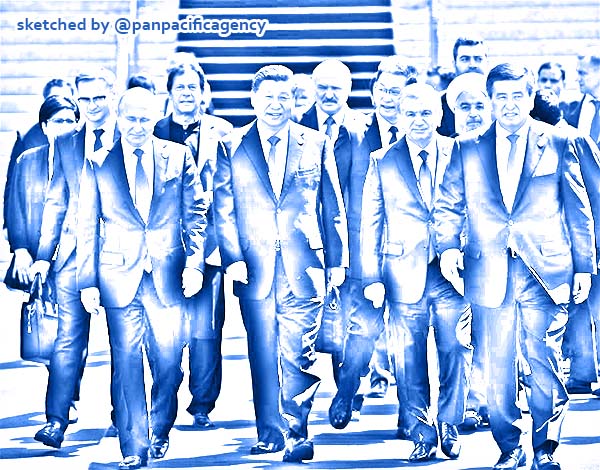[Analytics] Cooperation grows in Central Asia

Chinese President Xi Jinping (2nd L, front) and other leaders of the Shanghai Cooperation Organization (SCO) member countries and observer states, as well as representatives of regional and international bodies, head for group photos during the 19th meeting of the Council of Heads of State of the SCO in Bishkek, Kyrgyzstan, June 14, 2019. (Xinhua/Yin Bogu). Sketched by the Pan Pacific Agency.
The main political trend in Central Asia for 2019 was the steady improvement of interstate relations. This was primarily driven by Uzbekistan’s desire to repair relations with its neighbours. The country’s President Shavkat Mirziyoyev noted ‘our rapprochement and expansion of cooperation in the region is a demanded and irreversible process’. Kirill Nourzhanov specially for the East Asia Forum.
Border delimitation and demarcation proceeded apace including a historic land swap between Kyrgyzstan and Uzbekistan. But despite the heads of state’s emphasis on peace and good neighbourly relations, residents of the adjoining areas of Kyrgyzstan and Tajikistan in the Ferghana Valley repeatedly clashed over land and water use. The second annual meeting of Central Asian leaders in November 2019 noted a higher level of interaction and mapped out the potential for effective regional collaboration on issues such as trade, transport connectivity and renewable energy.
In March 2019, Kazakhstan’s president Nursultan Nazarbayev resigned at 78 after nearly 30 years at the country’s helm. In a move suggestive of a Singaporean model of managed political succession, he retained substantial formal and informal power as head of the Security Council and a post-independence nation builder. Nazarbayev’s handpicked successor, Kassym-Jomart Tokayev, won the presidential election of June 2019 comfortably, campaigning on the platform of safeguarding his predecessor’s legacy.
Towards the end of 2019 signs of tension between Tokayev and Nazarbayev began to emerge over executive personnel appointments that prompted speculation about the viability of the ‘Kazakh tandem’ and elite in-fighting exacerbated by possible popular protests. But these fears seem unfounded at present — unless something extraordinary happens the transit of power in Kazakhstan is likely to proceed in an unhurried and orderly fashion.
In Kyrgyzstan the rift between the incumbent head of state and his predecessor reached crisis proportions. In the context of a corruption investigation, President Sooronbay Jeenbekov stripped his former mentor and patron, Almazbek Atambayev, of immunity and had him and senior figures from his administration arrested. Atambayev resisted arrest and was subsequently accused of plotting a coup.
Both sides of the conflict appealed to Moscow for support. Russian President Vladimir Putin ended up calling on the Kyrgyz people to rally around Jeenbekov in the name of political stability and state development. While Jeenbekov’s position appears to be consolidated, the 2020 parliamentary election campaign may provide his opponents with an opportunity to mobilise support and challenge his government through legitimate means.
Turkmenistan continued to grapple with a severe economic crisis, hyperinflation and widespread food shortages. Its reclusive President, Gurbanguly Berdymuhamedov, resorted to a frantic reorganisation of the officialdom to compensate for years of poor decisions and grotesque mismanagement. The former head of the presidential security apparatus and the long-serving interior minister were thrown in jail and then paraded on state TV confessing to heinous crimes, causing observers to talk about an averted palace coup.
Increasing volumes and value of natural gas exported to China may throw the regime a lifeline but also increase its already substantial dependence on Beijing. In the meantime, alternative pipeline projects have stalled. The southward-bound TAPI gas route that was supposed to become operational in 2020 may not be realised until after 2030, if at all, according to the Asian Development Bank’s prognosis.
Security threats from Afghanistan were salient on Tajikistan’s political agenda. In early 2019, President Emomali Rahmon spoke about the ‘escalating threats of terrorism, extremism and other contemporary menaces’ emanating from the neighbouring country. His security officials reported constant clashes on the border with criminal and terrorist groups and warned that a major cross-border incursion was imminent. This warning seemed to have come true in November 2019 when a group of militants traversed the frontier deep into Tajik territory and attacked a checkpoint on the Tajikistan–Uzbekistan border. Islamic State claimed responsibility for the raid.
While there are question marks about the true extent of the Afghanistan threat, which may be exaggerated by Dushanbe, Russia and China treat the security situation on the ground seriously. In 2019, the Kremlin redoubled its efforts to enhance its southern ally’s military capacity and bolster its own forces at the 201st base. Beijing also increased security assistance and set up its own military outpost in Tajikistan’s remote Gorno-Badakhshan region, with the full knowledge of Moscow.
Security cooperation is just one facet of the China–Russia partnership in Central Asia that appears genuine and is likely to persist over the medium term. The regional economic integration projects pursued by both states, such as the Eurasian Economic Union and the Belt and Road Initiative (BRI), may not complement each other fully but neither do they generate open competition.
In 2019, Beijing’s self-restraint in relation to Moscow and the regional capitals was boosted by a groundswell of Sinophobia in Central Asia. Grassroots resentment fuelled by unfair land and labour practices, BRI-related indebtedness, broken promises, corruption and persecution of Muslims in Xinjiang led to anti-Chinese protests in Kazakhstan, Kyrgyzstan and Tajikistan.
Whether the relaxation of tensions and nascent goodwill leads to meaningful cooperation between the five Central Asian countries will be a key story to watch in 2020. Whatever transpires, Moscow and Beijing’s apprehension that the United States and the European Union may try to steer this cooperation in the direction of self-contained regionalism seems misguided.
Kirill Nourzhanov is a Senior Lecturer at the Centre for Arab and Islamic Studies, The Australian National University.